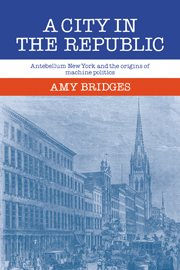Book contents
7 - A HOUSE OF POWER IN TOWN
Published online by Cambridge University Press: 07 October 2011
Summary
A historical exploration of city government in the United States reveals a set of recurrent if not constant themes: corruption and extravagance, the sacrifice of the public weal to private ends, the abuse of patronage. These outrages are denounced, evils bemoaned, opportunities seen and taken, scurrilities unmasked, men in office declared unfit, and defenders of the common good put forward and defeated with depressing regularity. Yet by accounts both contemporary and retrospective something in particular, something extraordinary and surely something worse, happened in the antebellum city. By the 1850s, reformers were declaring that the issue was not who would govern the city but whether the city could be governed at all.
Some elements of this “ungovernedness” are readily apparent. The antitemperance riot of 1857 and the mass demonstrations of 1854–57 marked a dramatic escalation in political protest and collective violence. There was more bribery and more talk of corruption than in the prior two decades. The institutional coherence of the city government was torn by the interventions of the state legislature. Factionalized parties offered voters three, four, five, or six slates to choose from, and the tabulated votes in some wards significantly exceeded the size of the registered electorate.
In addition to the popular causes of disorder, there was disorder among the leading men of New York's economic and political life. For the better part of the antebellum period, there were broad areas of agreement among politicians and men of wealth.
- Type
- Chapter
- Information
- A City in the RepublicAntebellum New York and the Origins of Machine Politics, pp. 125 - 145Publisher: Cambridge University PressPrint publication year: 1984



